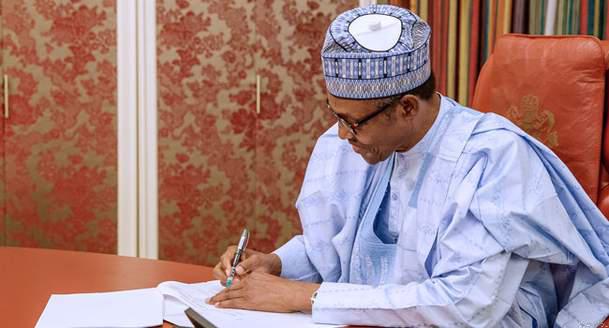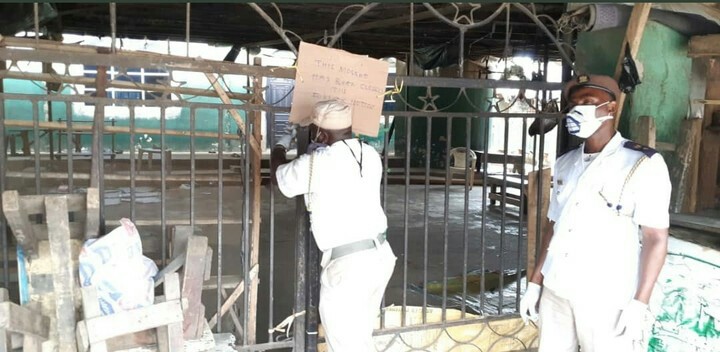Politics
The State of Local Government in Nigeria; a pip for fraud & major setback to the Federalist clause

In his 2015 inaugural speech, President Muhammadu Buhari said; “Constitutionally, there are limits to powers of each of the three tires of government but that should not mean the Federal Government should fold its arms and close its eyes to what is going on the states and local governments. Not least the operations of the local government joint accounts. While the Federal Government cannot interfere in the details of its operations, it will ensure that the gross corruption at the local levels is checked. As far as the constitution permits me, I will try to ensure that there is responsible and accountable government at all levels of governments in the country. I will not have kept my own trust with the Nigerian people if I allow other to abuse theirs under my watch.”
Following from the Presidential outburst above, it is equally disturbing that plans to ‘colonies’ the local governments by many governors started with failure to conduct the local government elections. Following some States in Nigeria, local government election have not been held for close to a decade in sharp contrary to section 7 of the 1999 constitution of the Federal Republic of Nigeria.
From the Nigeria revenue sharing formula, the federal government gets 52. 68 percent every month, 26.72 % goes to the 36 states government from the federation account while the remaining 20. 60% goes to the 774 local governments we have in the country. Sadly enough, this percentage most of the time does not get to the local government, only to be shared by almighty state governors. There is no gainsaying that local government which is supposed to be the closest government to the people at the grassroots, has become an annex of state government in all ramifications.
Very importantly, Financial autonomy of a local government refers to its ability to decide freely on its internal financial affairs. The ability to manage its funds independently enables the council to set and realise its strategic aims and objectives.
It’s pertinent to point out that, among the expected functions of a local government council includes but not limited to; road construction, rehabilitation, traffic management, housing, environments, recreation, fire services, market creations and maintenance, tax, community support (building public utilities) services and others.
Statistical findings shows that from 2008-2019 a total of 16 trillion naira of funds belonging to the 774 local governments in Nigeria has been grossly diverted by state governors. This among others, are the unlimited havoc wrecked on the efficacy of the local government.
In Nigeria of today, 20% of states does not have democratically elected local government officials, they are either super Imposed as caretakers for a certain period of time or as council managers, and other nomenclatures. The state electoral commission saddled with the responsibility of conducting local elections are now an appendage of the ruling party in those states; thereby truncating the will of the people.
Osun State as a case study, despite the fact that there are duly elected local government administration, yet the state government is still in charge of who receives what, how much and what to use what for in terms of financial resources; which implies, there is no such thing as financial autonomy in the local government.
The obnoxious conducts of some state governors are not only unconstitutional but also condemnable, anti-people, selfish and in aberration of the purpose of local government as the third tire of government in the Federal Republic of Nigeria. Along with the stranglehold of the third tire of the government by the governors, some through the local government joint accounts while at the other extreme, governors withhold allocations to councils for one reason or the other.
*LOOKING AT THE SOUTH-WEST STATES AS EXAMPLES*
*OSUN STATE*
Before the 2018 local government election, the last local government election was held in December, 2007. The Supreme Court on 17th December, 2010 upheld the judgment of appeal court delivered on 19th March, 2009 which voided the Election conducted on 15th December, 2007 by Osun State Independent Electoral Commission (OSSIEC) and declared the council Chairmen null and void.
Since then, the councils have been under one form of interim administration or the other.
New OSSIEC was inaugurated on 27th September, 2013 after all legal battles on the composition and appointments of old OSSIEC have been administered. Another reason being for the delayed local council election in Osun was the process of creating new local council development areas (LCDAs) initiated by Governor Aregbesola led administration about six years ago. Professor Yemi Osinbajo SAN (now Nigerian Vice President) had, at a lecture delivered on local government creation in Osun, maintained that local government creation is a state driven process which entails seven stages performed in accordance with section 7 (1&2) and section 8 (3-6) of the 1999 constitution of the Federal Republic of Nigeria.
The professor Mojeed Alabi led LCDAs creation committee recommended creation of 27 additional councils but the state house of assembly, at the tail of 5th assembly, passed creation of 39 additional councils into law and assented to by the then governor of Osun State.
Considering the economic and financial situation in the state, it is somehow a bit difficult for the state to move on with 69 councils (highest in the country) while the suffering of of unavailability of found coming from the local government Chairmen were not exposed but known to them for some period of time but were later exposed to the people of Osun when many of them were struggling to complete one project or the other.
Though, governor Aregbesola managed the local government funds the best way he could in the interest of the people of Osun.
*EKITI STATE*
Before December 2017, the previous council election held in the state was in 2009. The attempt of the administration of Dr. Kayode Fayemi in his first tenure as the governor of the state to conduct local government elections were halted by the courts. The people Democratic Party (PDP) in the state instituted the case against the composition of Ekiti state independent electoral commission (EKSIEC) on the premise that some members of the commission were members of the All Progressive Congress (APC). At the tail of Dr. Fayemi’s first administration in 2014, new 19 local council development area (LCDAs) were created and caretaker committees were appointed to run them.
His successor, Mr. Ayodele Fayose, set aside the new LCDAs while the caretaker committees in the original 16 local governments and conducted local government election in the state not too long of his inauguration as the state governor.
*OYO STATE*
In oyo state, 33 councils were run by caretaker committees before 12th of May, 2018, given that the previous council election was held in the state on 15th December, 2007. The immediate past Governor of oyo state, Senator Abiola Ajimobi followed the dishonorable precedent of his predecessor, Chief Alao Akala by dissolving constitutionally constituted oyo state independent electoral commission (OYSIEC) in June 2011.
The high court in Ibadan gave judgment on the suit that the dissolution of OYSIEC was unconstitutional, null and void and that the dissolved members were entitled to continue in the office as officers of OYSIEC until the expiration of their tenure on September 5, 2012. They were therefore to be paid all their entitlements till date. The precedent from the above up to the Supreme Court, and the Ajimobi led government regime in line with the directive.
With such precedence, no one would expect the Ajimobi government to have made the same mistake, let alone of taking the case to Appeal Court If pre-concieved intention is not to attached. The state government under Ajimobi were advised to withdrew its appeals (if any) and settle all the entitlements of the people at the grassroots areas and in compliance with the constitution of the federal republic of Nigeria. At exactly 12 months to the end of Ajimobi’s reign in Oyo, he conducted council poll in May 2018. While his successor, Engr. Seyi Makinde already started same selfish and unlawful act for him to have announced the resolution of the democratically elected council chairmen in the State.
*LAGOS & OGUN STATES*
A roll call of Lagos and Ogun States with available records of elections into local government councils showed that the two states held their previous elections in 2012 during Governor Fashola and Gbenga Daniel administrations until recently after five years that the administration of Akinwumi Ambode and Ibikunle Amosun decided not to conduct local governments election in Lagos and Ogun in July 2017 and ….
*ONDO STATE*
Local government election was last held in Ondo state in December 2007 under late (Dr.) Olusegun Agagu. The chairmen of the councils were dissolved by the former governor, Dr. Olusegun Mimiko on assumption of office as the governor of the state. He also dissolved the Ondo State Independent Electoral Commission (ODSIEC) whose tenure had not expired at the time. The dissolution led to institution of legal actions which the governor claimed, during his first tenure, did not allow the state to conduct council election.
It could be inferred that the dissolution by the governor was aimed at denying the councils from being run by elected officers.
It is even more irritating that despite the fact that the legal battles have been dispensed with and new ODSIEC constituted at the start of Mimiko’s second term administration, he continued to run the councils with caretaker committees till the end of his tenure, and recently devolved by the incumbent governor of the state, Arakunrin Akeredolu. Up till now, there is no difference between Olusegun Mimiko and Rotimi Akeredolu administration in terms of local government administration. Governor Akeredolu dissolved and constituted a new set of caretaker committees to run the local government in the state. Though, the administration of Governor Akeredolu fixed December 2018 for the state local government election begore the court order the stop to it.
As the Akeredolu’s administration is going to and end, it is advisable for him to commence fresh process to conduct elections in no distant date as continuity of using caretaker committees to run the councils constitute illegality
*CONCLUSION*
State governors (former and current) cannot be exonerated from being the brain behind the legal action-prone conducts in this regard in order to foist their stooges on the people in the name of caretaker committees at local governments for almost a decade in Osun, Oyo, Ondo and some state of the federation was attributed to legal battles in disguise arising from deliberate dissolution of elected council officers, dissolution of the independent electoral commissions (SIECs) or controversial appointment/compositions SIECs.
It is not just enough to grant autonomy to the local governments, but a direct funding without undue involvement of the government at the state level must be vehemently enforced. If the closest government to the people in its real sense is allowed to perform those assigned functions, then it would be easier for us as a nation to attain true fiscal federalism where every tiers of government will begin to assume individual controls over sensitive resources & discharge of responsibilities within its reach.
The apparent reluctance of the state governors to agree with President Buhari to separate the Joint Allocation Account being managed by the state governments is somewhat consistent with their opposition to local government autonomy. One must not be in doubt that the use of caretaker committees or whatever appellation attached to it in the administrative of the council areas is a conduct pipe for fraud and a major setback to the federalist clause.
The delay in the autonomy is a clog in the wheel of progress in the states, local governments and grassroots governments which aid the flow of development programmer of states and federal government to the rural areas. They are accountable to the people, independent and free from the overbearing control and influence of the state governors as witnessed in the case of caretaker committee and elected but financially caged Council Chairmen.
-

 Celebrities4 days ago
Celebrities4 days agoOriyomi Hamzat hospitalised after Ibadan stamdpede
-

 Metro/Crime6 days ago
Metro/Crime6 days agoNigerian varsity lecturer assassinated
-

 News4 days ago
News4 days agoOoni’s Ex-Wife Arrested Over Alleged Death of 35 Children In Ibadan
-

 News4 days ago
News4 days agoOoni breaks silence over Ibadan stamdpede, sends message to party involved
-

 News6 days ago
News6 days agoState Govt seals churches, other establishments
-

 Politics6 days ago
Politics6 days agoBola Tinubu Approves Eight New Appointments (Full List)
-

 Osun News2 days ago
Osun News2 days agoOsogbo agog as Osun former Deputy Gov, Titi Tomori-ponle launches TTP Foundation
-

 Politics3 days ago
Politics3 days agoCourt Sacks APC State Chairman






